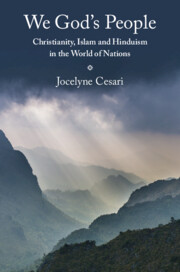Book contents
- We God’s People
- We God’s People
- Copyright page
- Dedication
- Epigraph
- Contents
- Figures and Tables
- Acknowledgments
- Note on Transliteration and Italicization
- Introduction
- 1 Framing the Question
- 2 State, Islam, Nation and Patriotism: Never-Ending Tensions
- 3 The Nexus of Secularism and Communalism, or Hinduism as a Political Project
- 4 Religion and the Transcendent State in China
- 5 Orthodoxy: Between Nation and Empire
- 6 Patterns of Religion-Politics Interactions
- Conclusion
- Bibliography
- Index
4 - Religion and the Transcendent State in China
Published online by Cambridge University Press: 11 December 2021
- We God’s People
- We God’s People
- Copyright page
- Dedication
- Epigraph
- Contents
- Figures and Tables
- Acknowledgments
- Note on Transliteration and Italicization
- Introduction
- 1 Framing the Question
- 2 State, Islam, Nation and Patriotism: Never-Ending Tensions
- 3 The Nexus of Secularism and Communalism, or Hinduism as a Political Project
- 4 Religion and the Transcendent State in China
- 5 Orthodoxy: Between Nation and Empire
- 6 Patterns of Religion-Politics Interactions
- Conclusion
- Bibliography
- Index
Summary
The politicization of religion is the result of the competition over loyalties between the nation-state and religious groups. The state regulates the immanent and the transcendent. Allegiance to the state transcends the allegiance to God on the Chinese territory. The genealogy of this habitus is traced back to the Jesuit mission to China in the 16th century through the rise of the Communist Party and the current mode of regulation/repression of religion by the state, especially the Muslims in the Xinjiang province.
- Type
- Chapter
- Information
- We God's PeopleChristianity, Islam and Hinduism in the World of Nations, pp. 187 - 239Publisher: Cambridge University PressPrint publication year: 2021

